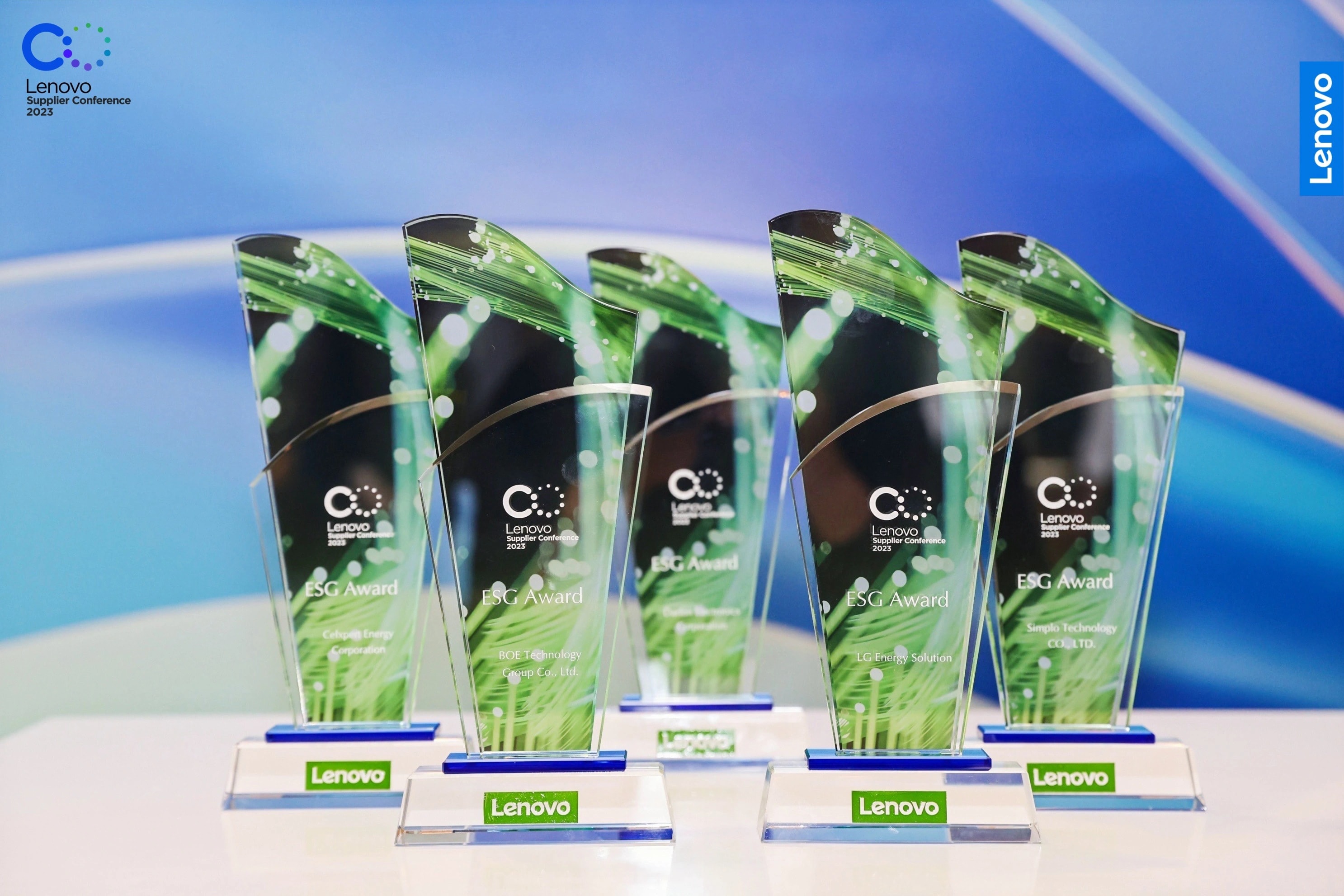- ESG
OperationsPlanetPerformanceReports
- REGULATORY
Export/ImportEnvironmentalAccessibility
Lenovo ESG
Supply Chain
Our Approach
Lenovo is committed to sound Environmental, Social and Governance (ESG) management across its end-to-end supply chain process. Along with demanding high-quality materials, parts, and products from our suppliers, we have ESG-specific systems in place, supported by contractual requirements to help ensure our suppliers meet or exceed applicable labor, environmental, health and safety, and ethics standards.
We recognize there is no end to this journey and there will be opportunities for improvement continually. Our approach includes:
Our Supply Chain at a Glance
As an approximate percentage of production spend:

of our procurement is with fewer than 130 large suppliers who typically have robust sustainability programs
of our procurement is with fewer than 130 large suppliers who typically have robust sustainability programs

of our suppliers are independently audited and covered in our direct validation efforts
of our suppliers are independently audited and covered in our direct validation efforts

of our suppliers have ISO 9001 and ISO 14001 certifications
of our suppliers have ISO 9001 and ISO 14001 certifications

of our suppliers issue formal public sustainability reports
of our suppliers issue formal public sustainability reports

of our suppliers are formal Responsible Business Alliance members
of our suppliers are formal Responsible Business Alliance members
* Data as of July 2024 Key Supplier Base Report
Key Elements:
- Procurement Values and Ethical Dealings
- Conflicts of Interest and Business Integrity
- Supply Chain Security
- Human Rights
- Responsible Business Alliance
- Employment Agencies
- Climate Change
- Environmental Aspects
- Responsible Sourcing of Raw Materials
- Non-Discrimination and Non-Retaliation
- Supplier Diversity
- Sustainability Reports, Assessments and Product Certifications
- Supply Chain Due Diligence
- Reporting Questions or Concerns
Human Rights, Environmental Impacts, Integrity
We expect our suppliers to meet the highest standards of responsible and ethical conduct regarding how they treat their workers and the environment, and how they do business. This expectation is supported by contractual requirements.
Lenovo’s standard purchase order (PO), PO Terms and Conditions, and contracts stipulate supplier compliance with our comprehensive Supplier Code of Conduct. This code upholds our values and includes provisions that prohibit human trafficking, discrimination, retaliation to worker complaints, bribery, and corruption. It also requires our suppliers to have formal grievance mechanisms in place. We will assess conformance to these requirements in making procurement decisions.
Lenovo works with the electronics industry on supply chain issues through our Responsible Business Alliance (RBA) (formerly the Electronics Industry Citizenship Coalition (EICC)) membership. Lenovo contractually applies the RBA Code of Conduct and associated audit requirements.
Support of RBA Programs and Validated Audit Process (VAP) Audits
Lenovo requires suppliers to adhere to the RBA Code of Conduct. Regardless of their RBA self-assessment risk level, Lenovo requires 95 percent of suppliers by spend to conduct an RBA audit (including both Validated Audit Program (VAP) and equivalent independent, third-party audit (non-VAP audit) by RBA-approved auditors) every two years. Lenovo started an effort to require its suppliers to commit to achieving RBA VAP) Recognition and Factory of Choice (FOC) designations to demonstrate leadership in ESG since FY 2020/21. This requires significantly higher VAP audit scores with all Priority findings closed, site personnel to be formally trained on the RBA VAP process, and proof of functional grievance systems. The table below provides an overview of Lenovo’s suppliers’ annual RBA audit performance.
Historical average scores1
| Labor Score | Health & Safety Score | Environment Score | Ethics Score | Management Score | Total Score | # of Priority findings2 | # of Major findings2 | |
| Suppliers | ||||||||
|---|---|---|---|---|---|---|---|---|
| 2020 | 157 | 173 | 189 | 199 | 190 | 155 | 0.3 | 5.4 |
| 2021 | 159 | 182 | 193 | 198 | 195 | 164 | 0.1 | 4.7 |
| 2022 | 160 | 182 | 190 | 199 | 196 | 164 | 0.2 | 4.4 |
| 2023 | 165 | 182 | 197 | 200 | 195 | 169 | 0.1 | 4.3 |
| ODM Partners | ||||||||
| 2020 | 166 | 188 | 196 | 200 | 197 | 172 | 0.2 | 3.3 |
| 2021 | 167 | 182 | 195 | 195 | 195 | 170 | 0.2 | 3.3 |
| 2022 | 165 | 191 | 187 | 198 | 194 | 172 | 0.0 | 3.8 |
| 2023 | 171 | 193 | 196 | 199 | 194 | 178 | 0.0 | 3.2 |
*Data as in Lenovo FY 2023/24 ESG Report
1 Scores are based on calendar year.
2 The average number of findings is calculated based on the total number of findings and total number of reports per calendar year.
Responding to RBA Audit Labor-Related Results
When there are audit findings, we ensure closure of supplier action plan. In FY 2023/24, there were no violations reported related to forced labor or child labor by Lenovo’s suppliers who completed the RBA VAP audits. In FY 2023/24, 56 56 suppliers had other major labor findings identified in their audits. The most common supplier audit findings are related to an industry-wide problem of excessive working hours and insufficient time off for their employees.
Lenovo requires its outsourced manufacturers to report their employees’ working hours and time of performance monthly via an online tool so that it can take action to resolve any issues that are identified. Agreements for improvement were reached with suppliers, as a result, no relationships were terminated due to aforementioned labor findings.
Forced Labor
To better detect and mitigate the forced labor risks, Lenovo adopts and implements preventive measures. In FY FY 2023/24, some of Lenovo’s actions to prevent this practice were:
- Started to engage labor agents and contractors to submit RBA indirect SAQ*
- Implemented a third-party ESG risk assessment tool (EcoVadis) to screen suppliers throughout the supply chain
- Provided an online course to buyers on forced labor and potential red flags related to forced labor
- Provided a webinar to suppliers on the topic of Labor Compliance Management
- Invested in a third-party supply chain risk management platform (Everstream Analytics)
- Conducted verification through RBA audits and participated in regular RBA Responsible Labor Initiative and VAP workgroup engagements
Environmental Impact
Currently, we ask our suppliers to report their environmental impact data (GHG emissions, water, waste, renewable energy) formally via the RBA or the CDP reporting methodologies in addition to responding to the Institute of Public and Environmental Affairs (IPE).
The FY 2023/24 Program performance as below:
Climate Change
Suppliers with public GHG reduction goals
Suppliers who track and report renewable energy generation and purchases
Suppliers with third-party verification of their GHG emissions data
Suppliers with public renewable energy goals
Science Based Targets for Suppliers
Water
Waste
Recognition
Responsible Sourcing of Raw Materials
- Lenovo is committed to ensuring that minerals used to manufacture products do not contribute to human rights abuse and environmental degradation, and requires its production procurement and ODM suppliers to do the same. Lenovo supports the efforts of the RBA Responsible Minerals Initiative (RMI) to address materials beyond the conflict minerals of tin, tantalum, tungsten and gold (3TG). In FY 2023/24, Lenovo conducted extensive due diligence for its supply chain using the RMI program’s Conflict Minerals Reporting Template (CMRT) and Extended Minerals Reporting Template (EMRT) and the RMI Responsible Minerals Assurance Process (RMAP). Lenovo will coordinate with the RMI as RMI performs risk profiles on other materials, assess the content in its products, and further develop due diligence efforts to mitigate supply chain risk. For more information, please visit the Lenovo Responsible Sourcing webpage.
- FY 2023/24 Program Performance (% of Procurement Spend)
| 100% | Conformant or active 3TG smelters & refiners |
| 96% | Suppliers with public conflict mineral policy |
| 77% | Suppliers who are formal RMI members |
| 76% | Suppliers with public conflict minerals report |
EcoVadis


Supplier ESG Performance Evaluation (ESG scorecards)
Supplier Engagements
Lenovo offers and provides the following training programs to suppliers, in order to facilitate supplier capability building:- Lenovo has an enhanced ESG digital platform with a supplier training module. This module offers a comprehensive suite of ESG training courses, ranging from detailed explanations of its ESG project requirements to sessions on the latest developments and best practices in ESG related issues.
- Semi-annual communications on the RBA, environmental impact, responsible sourcing of raw materials, key ISO certifications, ESG Reporting and Supplier Code of Conduct expectations
- Lenovo created education material for suppliers to learn its ESG requirements while providing an education session to 900 supplier attendees at 2023 Lenovo Standards and Certification Supplier Conference.
- In FY 2023/24, three webinars for suppliers were held (including one with CDP, one with EcoVadis), covering topics including Lenovo Supplier ESG Requirements for Suppliers, CDP Disclosure Training, EcoVadis CSR Rating, and EcoVadis Post Assessment, and RBA Compliance. Total attendee numbers were 633.
- In FY 2023/24, Lenovo GSC ESG team successfully held the 2023 Lenovo Supplier ESG Day online event. The event introduced Lenovo’s supply chain ESG Programs and new initiatives, and also shared best practice in supply chain carbon reduction and climate action, with an attendance of 671.
- In FY 2023/24, Lenovo’s online learning module to suppliers went live. By the end of FY 2023/24, Lenovo has released 17 online ESG courses for suppliers to learn, and 787 supplier representatives learn courses at this training platform.
Supplier ESG Awards
Five suppliers received the ESG award at the 2023 Supplier Conference. This is the second year that Lenovo awarded suppliers based on their ESG performance. The 5 suppliers are BOE, Celxpert, Darfon, LGES, and Simplo. Winners are supportive of Lenovo Procurement ESG Initiatives and are leading in ESG performance.

